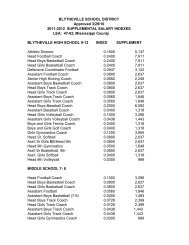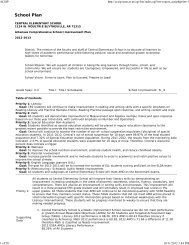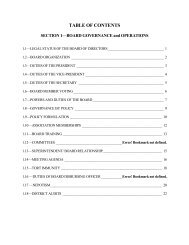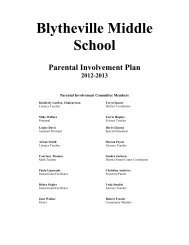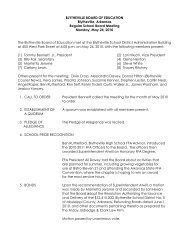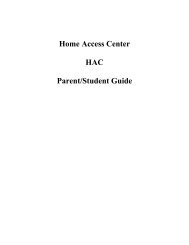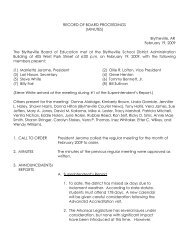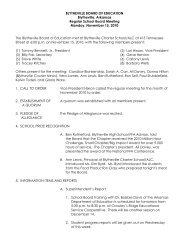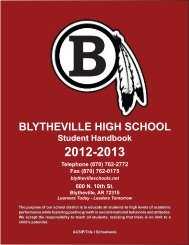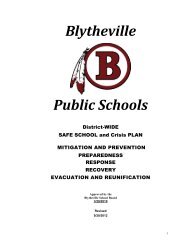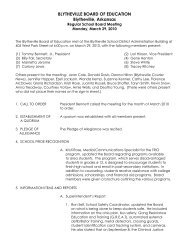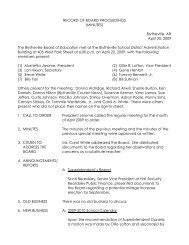Student Handbook - Blytheville Public Schools
Student Handbook - Blytheville Public Schools
Student Handbook - Blytheville Public Schools
You also want an ePaper? Increase the reach of your titles
YUMPU automatically turns print PDFs into web optimized ePapers that Google loves.
The Superintendent and the Board of Education shall complete the expulsion process of any student that was initiated because the student<br />
possessed a firearm or other prohibited weapon on school property regardless of the enrollment status of the student.<br />
Date Adopted: 04/09/77 Last Revised: 08/25/08<br />
4.32—SEARCH, SEIZURE, AND INTERROGATIONS<br />
The District respects the rights of its students against arbitrary intrusion of their person and property. At the same time, it is the responsibility of<br />
school officials to protect the health, safety, and welfare of all students enrolled in the District in order to promote an environment conducive to<br />
student learning. The Superintendent, principals, and their designees have the right to inspect and search school property and equipment. They<br />
may also search students and their personal property in which the student has a reasonable expectation of privacy, when there is reasonable<br />
suspicion to believe such student or property contains illegal items or other items in violation of Board policy or dangerous to the school community.<br />
School authorities may seize evidence found in the search and disciplinary action may be taken. Evidence found which appears to be in violation<br />
of the law shall be reported to the appropriate authority.<br />
School property shall include, but not be limited to, lockers, desks, and parking lots, as well as personal effects left there by students. When<br />
possible, prior notice will be given and the student will be allowed to be present along with an adult witness, however, searches may be done at<br />
any time with or without notice or the student’s consent. A personal search must not be excessively intrusive in light of the age and sex of the<br />
student and the nature of the infraction.<br />
The Superintendent, principals, and their designees may request the assistance of law enforcement officials to help conduct searches. Such<br />
searches may include the use of specially trained dogs.<br />
A school official of the same sex shall conduct personal searches with an adult witness of the same sex present.<br />
State Law requires that Department of Human Services employees, local law enforcement, or agents of the Crimes Against Children Division of<br />
the Department of Arkansas State Police, may interview students without a court order for the purpose of investigating suspected child abuse. In<br />
instances where the interviewers deem it necessary, they may exercise a “72-hour hold ” without first obtaining a court order. Other questioning of<br />
students by non-school personnel shall be granted only with a court order directing such questioning, with permission of the parents of a student<br />
(or the student if above eighteen [18] years of age), or in response to a subpoena or arrest warrant.<br />
If the District makes a report to any law enforcement agency concerning student misconduct or if access to a student is granted to a law<br />
enforcement agency due to a court order, the principal or the principal’s designee shall make a good faith effort to contact the student’s parent,<br />
legal guardian, or other person having lawful control by court order, or person acting in loco parentis on student enrollment forms. The principal<br />
or the principal’s designee shall not attempt to make such contact if presented documentation by the investigator that notification is prohibited<br />
because a parent, guardian, custodian, or person standing in loco parentis is named as an alleged offender of the suspected child maltreatment.<br />
This exception applies only to interview requests made by a law enforcement officer, an investigator of the Crimes Against Children Division of the<br />
Department of Arkansas State Police, or an investigator or employee of the Department of Human Services.<br />
In instances other than those related to cases of suspected child abuse, principals must release a student to either a police officer who presents<br />
a subpoena for the student, or a warrant for arrest, or to an agent of state social services or an agent of a court with jurisdiction over a child with<br />
a court order signed by a judge. Upon release of the student, the principal or designee shall give the student’s parent, legal guardian, or other<br />
person having<br />
lawful control by court order, or person acting in loco parentis notice that the student has been taken into custody by law enforcement personnel<br />
or a state’s social services agency. If the principal or designee is unable to reach the parent, he or she shall make a reasonable, good faith effort<br />
to get a message to the parent to call the principal or designee, and leave both a day and an after-hours telephone number. Date Adopted:<br />
04/20/92 Last Revised: 06/27/11<br />
4.33—STUDENTS’ VEHICLES<br />
A student who has presented a valid driver’s license and proof of insurance to the appropriate office personnel, may drive his/her vehicle to school.<br />
Vehicles driven to school shall be parked in the area designated for student parking. Parking on school property is a privilege which may be denied<br />
to a student for any disciplinary violation, at the discretion of the student’s building principal.<br />
<strong>Student</strong>s are not permitted to loiter in parking areas and are not to return to their vehicles during the school day for any reason unless given<br />
permission to do so by school personnel.<br />
It is understood that there is no expectation of privacy in vehicles in parking areas. Drivers of vehicles parked on a school campus will be held<br />
accountable for illegal substances or any other item prohibited by District policy found in their vehicle. The act of a student parking a vehicle on<br />
campus is a grant of permission for school or law enforcement authorities to search that vehicle.<br />
Date Adopted: 02/23/04<br />
Last Revised: 04/23/12<br />
4.34—COMMUNICABLE DISEASES AND PARASITES<br />
<strong>Student</strong>s with communicable diseases or with human host parasites that are transmittable in a school environment shall demonstrate respect<br />
for other students by not attending school while they are capable of transmitting their condition to others. <strong>Student</strong>s whom the school nurse<br />
determines are unwell or unfit for school attendance or who are believed to have a communicable disease or condition will be required to be<br />
picked up by their parent or guardian. Specific examples include, but are not limited to: chicken pox, measles, scabies, conjunctivitis (Pink Eye),<br />
impetigo/MRSA (Methicillin-resistant Staphylococcus aureus), streptococcal and staphylococcal infections, ringworm, mononucleosis, Hepatitis<br />
B or C, mumps, vomiting, diarrhea, and fever (100.4 F when taken orally). A student who has been sent home by the school nurse will be<br />
subsequently readmitted, at the discretion of the school nurse, when the student is no longer a transmission risk. In some instances, a letter from<br />
a health care provider may be required prior to the student being readmitted to the school.<br />
18



